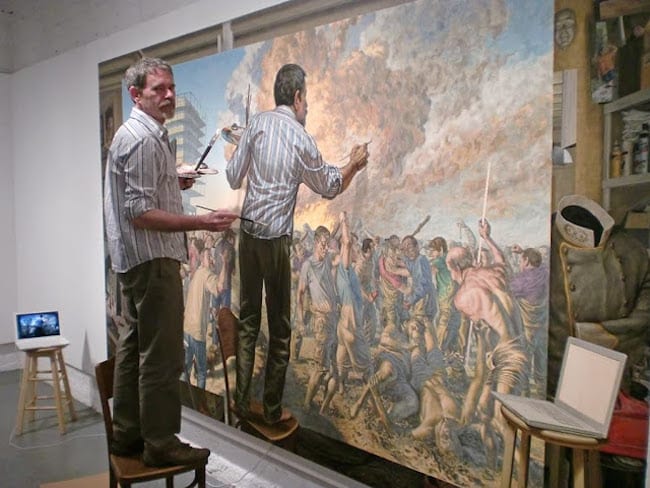Among our interests here at CFile, in addition to art, architecture and design, is the state of art education. In this issue we ran a commentary by Daniel Duford, who has a proposal for a new kind of art curriculum at the Pacific Northwest College of Art.
We recently came across a Huffington Post article by realist painter and Laguna College of Art and Design professor F. Scott Hess. It’s titled “Is De-Skilling Killing Your Arts Education?” Hess came up with the term “de-skilling” to describe what he claims is an academic prejudice against traditional skill, or, if you want to be blunt about it, Hess’ chosen field. Here’s one of his arguments:
The breadth and persistence of this prejudice against skill confounds common sense. Human emotion and intellect can be expressed through a variety of methods and techniques, but skilled representational art is extremely effective in engaging the human heart and energizing the mind. Yet for decades a large percentage of our art institutions have sought to banish its practice from the classroom. A future blog will consider why.
I asked my painter friends on Facebook to recount some of their art school horror stories. I got over a hundred responses. Some wished school names to be omitted for fear of repercussions. Some messaged me later and retracted because it might impact job possibilities. Some were afraid teaching colleagues would recognize themselves.
He then shares several anecdotes from artists who say that they have been singled out by their professors for their representational or figurative art. There’s horror stories of people who got a C for their craftsmanship, while another artist shared a story about a student who showed up with nothing for an assignment, but argued his way out of failing the project by saying “the absence of art is art.” Hess has his own story about studying a human head figure and a drunken professor smashing it while screaming, “This is not art!”
We’d like to open the comment section up for discussion on this topic. What do you think? Is Hess onto something or is he still traumatized by that encounter back in 1974? Without taking a side in this debate, I’ll say that his post is part of a larger fear in our culture: That there’s a cabal of tenured, entrenched academic types who, instead of nurturing students’ personal growth, seek to indoctrinate them. You see this idea mostly popping up around politics. I’m reminded of a push back in 2005 by conservative columnist David Horowitz who argued that students needed a Bill of Rights to protect them from the liberal indoctrinations of their professors.
What do you think? Share your thoughts in the comment box below.
Bill Rodgers is a Contributing Editor at CFile.
Above image: F. Scott Hess painting at the Koplin Del Rio Gallery.

Add your valued opinion to this post.